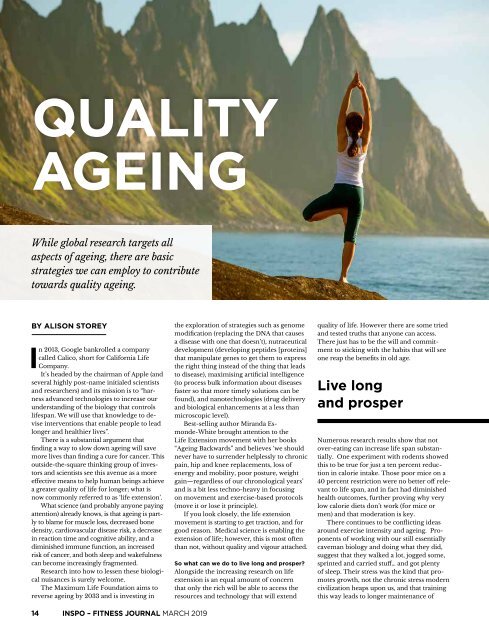INSPO Fitness Journal March 2019
Everything from nutrition, beauty, home and workplace wellbeing to health, performance – and so much more.
Everything from nutrition, beauty, home and workplace wellbeing to health, performance – and so much more.
You also want an ePaper? Increase the reach of your titles
YUMPU automatically turns print PDFs into web optimized ePapers that Google loves.
QUALITY<br />
AGEING<br />
While global research targets all<br />
aspects of ageing, there are basic<br />
strategies we can employ to contribute<br />
towards quality ageing.<br />
BY ALISON STOREY<br />
In 2013, Google bankrolled a company<br />
called Calico, short for California Life<br />
Company.<br />
It’s headed by the chairman of Apple (and<br />
several highly post-name initialed scientists<br />
and researchers) and its mission is to “harness<br />
advanced technologies to increase our<br />
understanding of the biology that controls<br />
lifespan. We will use that knowledge to devise<br />
interventions that enable people to lead<br />
longer and healthier lives”.<br />
There is a substantial argument that<br />
finding a way to slow down ageing will save<br />
more lives than finding a cure for cancer. This<br />
outside-the-square thinking group of investors<br />
and scientists see this avenue as a more<br />
effective means to help human beings achieve<br />
a greater quality of life for longer; what is<br />
now commonly referred to as ‘life extension’.<br />
What science (and probably anyone paying<br />
attention) already knows, is that ageing is partly<br />
to blame for muscle loss, decreased bone<br />
density, cardiovascular disease risk, a decrease<br />
in reaction time and cognitive ability, and a<br />
diminished immune function, an increased<br />
risk of cancer, and both sleep and wakefulness<br />
can become increasingly fragmented.<br />
Research into how to lessen these biological<br />
nuisances is surely welcome.<br />
The Maximum Life Foundation aims to<br />
reverse ageing by 2033 and is investing in<br />
the exploration of strategies such as genome<br />
modification (replacing the DNA that causes<br />
a disease with one that doesn’t), nutraceutical<br />
development (developing peptides [proteins]<br />
that manipulate genes to get them to express<br />
the right thing instead of the thing that leads<br />
to disease), maximising artificial intelligence<br />
(to process bulk information about diseases<br />
faster so that more timely solutions can be<br />
found), and nanotechnologies (drug delivery<br />
and biological enhancements at a less than<br />
microscopic level).<br />
Best-selling author Miranda Esmonde-White<br />
brought attention to the<br />
Life Extension movement with her books<br />
“Ageing Backwards” and believes ‘we should<br />
never have to surrender helplessly to chronic<br />
pain, hip and knee replacements, loss of<br />
energy and mobility, poor posture, weight<br />
gain—regardless of our chronological years’<br />
and is a bit less techno-heavy in focusing<br />
on movement and exercise-based protocols<br />
(move it or lose it principle).<br />
If you look closely, the life extension<br />
movement is starting to get traction, and for<br />
good reason. Medical science is enabling the<br />
extension of life; however, this is most often<br />
than not, without quality and vigour attached.<br />
So what can we do to live long and prosper?<br />
Alongside the increasing research on life<br />
extension is an equal amount of concern<br />
that only the rich will be able to access the<br />
resources and technology that will extend<br />
quality of life. However there are some tried<br />
and tested truths that anyone can access.<br />
There just has to be the will and commitment<br />
to sticking with the habits that will see<br />
one reap the benefits in old age.<br />
Live long<br />
and prosper<br />
Numerous research results show that not<br />
over-eating can increase life span substantially.<br />
One experiment with rodents showed<br />
this to be true for just a ten percent reduction<br />
in calorie intake. Those poor mice on a<br />
40 percent restriction were no better off relevant<br />
to life span, and in fact had diminished<br />
health outcomes, further proving why very<br />
low calorie diets don’t work (for mice or<br />
men) and that moderation is key.<br />
There continues to be conflicting ideas<br />
around exercise intensity and ageing. Proponents<br />
of working with our still essentially<br />
caveman biology and doing what they did,<br />
suggest that they walked a lot, jogged some,<br />
sprinted and carried stuff… and got plenty<br />
of sleep. Their stress was the kind that promotes<br />
growth, not the chronic stress modern<br />
civilization heaps upon us, and that training<br />
this way leads to longer maintenance of<br />
14 <strong>INSPO</strong> – FITNESS JOURNAL MARCH <strong>2019</strong>


















